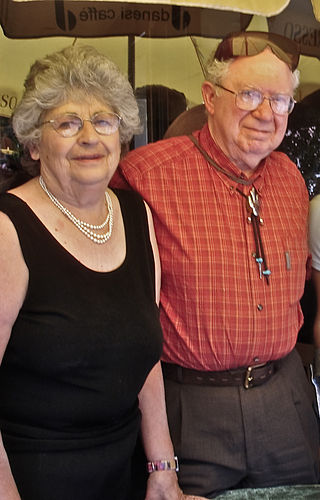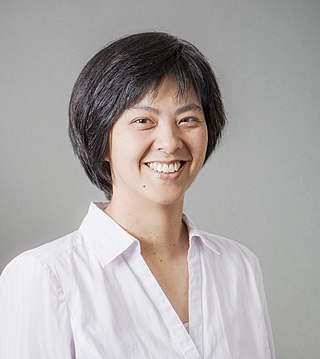
Barry William Boehm was an American software engineer, distinguished professor of computer science, industrial and systems engineering; the TRW Professor of Software Engineering; and founding director of the Center for Systems and Software Engineering at the University of Southern California. He was known for his many contributions to the area of software engineering.
Gabor Tamas Herman is a Hungarian-American professor of computer science. He is Emiritas Professor of Computer Science at The Graduate Center, City University of New York (CUNY) where he was Distinguished Professor until 2017. He is known for his work on computerized tomography. He is a fellow of the Institute of Electrical and Electronics Engineers (IEEE).
Zorica Pantić, also known as Zorica Pantić-Tanner, born 1951 in Yugoslavia, is a professor of electrical engineering and past president of Wentworth Institute of Technology in Boston.

The President's Council of Advisors on Science and Technology (PCAST) is a council, chartered in each administration with a broad mandate to advise the president of the United States on science and technology. The current PCAST was established by Executive Order 13226 on September 30, 2001, by George W. Bush, was re-chartered by Barack Obama's April 21, 2010, Executive Order 13539, by Donald Trump's October 22, 2019, Executive Order 13895, and by Joe Biden's February 1, 2021, Executive Order 14007.
George A. Bekey is an American roboticist and the Professor Emeritus of Computer Science, Electrical Engineering and Biomedical Engineering at the University of Southern California.

Tony Fan-Cheong Chan is a Chinese American mathematician who has been serving as President of the King Abdullah University of Science and Technology (KAUST) since 2018. Prior that, he was President of the Hong Kong University of Science and Technology from 2009 to 2018.
Jayant R. Haritsa is an Indian computer scientist and professor. He is on the faculty of the CDS and CSA departments at Indian Institute of Science, Bangalore, India. He works on the design and analysis of Database Systems. In 2009 he won the Shanti Swarup Bhatnagar Prize sponsored by CSIR, India. In 2014 he won the Infosys Prize for Engineering.

Thelma Estrin was an American computer scientist and engineer who did pioneering work in the fields of expert systems and biomedical engineering. Estrin was one of the first to apply computer technology to healthcare and medical research. In 1954, Estrin helped to design the Weizmann Automatic Computer, or WEIZAC, the first computer in Israel and the Middle East, a moment marked as an IEEE Milestone in Electrical and Computer Engineering. She was professor emerita in the Department of Computer Science, University of California at Los Angeles (UCLA).
Maja Matarić is an American computer scientist, roboticist and AI researcher, and the Chan Soon-Shiong Distinguished Professor of Computer Science, Neuroscience, and Pediatrics at the University of Southern California. She is known for her work in human-robot interaction for socially assistive robotics, a new field she pioneered, which focuses on creating robots capable of providing personalized therapy and care that helps people help themselves, through social rather than physical interaction. Her work has focused on aiding special needs populations including the elderly, stroke patients, and children with autism, and has been deployed and evaluated in hospitals, therapy centers, schools, and homes. She is also known for her earlier work on robot learning from demonstration, swarm robotics, robot teams, and robot navigation.
Nancy Marie Amato is an American computer scientist noted for her research on the algorithmic foundations of motion planning, computational biology, computational geometry and parallel computing. Amato is the Abel Bliss Professor of Engineering and Head of the Department of Computer Science at the University of Illinois at Urbana-Champaign. Amato is noted for her leadership in broadening participation in computing, and is currently a member of the steering committee of CRA-WP, of which she has been a member of the board since 2000.
Chung-Chieh Jay Kuo is a Taiwanese electrical engineer and the director of the Multimedia Communications Lab as well as distinguished professor of electrical engineering and computer science at the University of Southern California. He is a specialist in multimedia signal processing, video coding, video quality assessment, machine learning and wireless communication.

Shrikanth Narayanan is an Indian-American Professor at the University of Southern California. He is an interdisciplinary engineer–scientist with a focus on human-centered signal processing and machine intelligence with speech and spoken language processing at its core. A prolific award-winning researcher, educator, and inventor, with hundreds of publications and a number of acclaimed patents to his credit, he has pioneered several research areas including in computational speech science, speech and human language technologies, audio, music and multimedia engineering, human sensing and imaging technologies, emotions research and affective computing, behavioral signal processing, and computational media intelligence. His technical contributions cover a range of applications including in defense, security, health, education, media, and the arts. His contributions continue to impact numerous domains including in human health, national defense/intelligence, and the media arts including in using technologies that facilitate awareness and support of diversity and inclusion. His award-winning patents have contributed to the proliferation of speech technologies on the cloud and on mobile devices and in enabling novel emotion-aware artificial intelligence technologies.
Venkata Narayana Padmanabhan is a computer scientist and principal researcher at Microsoft Research India. He is known for his research in networked and mobile systems. He is an elected fellow of the Indian National Academy of Engineering, Institute of Electrical and Electronics Engineers and the Association for Computing Machinery. The Council of Scientific and Industrial Research, the apex agency of the Government of India for scientific research, awarded him the Shanti Swarup Bhatnagar Prize for Science and Technology, one of the highest Indian science awards for his contributions to Engineering Sciences in 2016.

Ellis Meng is the Shelly and Ofer Nemirovsky Chair of Convergent Biosciences and Professor of Biomedical Engineering and Electrical and Computer Engineering in the Viterbi School of Engineering at the University of Southern California, where she also serves as the Vice Dean of Technology Innovation and Entrepreneurship. Meng is highly decorated in the development of novel micro- and nanotechnologies for biomedical applications. In 2009, Meng was named on MIT Technology Review's "Innovators Under 35" List for her work on micropumps that deliver drugs preventing blindness, and she was listed on the 40 Under 40 List of the Medical Device and Diagnostic Industry (MDDI) in 2012.
Mansun Chan is an Alex Wong Siu Wah Gigi Wong Fook Chi Professor of Engineering and Chair Professor at the Department of Electronic & Computer Engineering, HKUST and Director of Nanoelectronics Fabrication Facility/Adjunct Professor, Peking University Shenzhen Graduate School. He was named Fellow of the Institute of Electrical and Electronics Engineers (IEEE) in 2013 for contributions to CMOS device modeling.

Michael James Carey is an American computer scientist. He is currently a Distinguished Professor (Emeritus) of Computer Science in the Donald Bren School at the University of California, Irvine and a Consulting Architect at Couchbase, Inc..
Emily Mower Provost is a professor of computer science at the University of Michigan. She directs the Computational Human-Centered Artificial Intelligence (CHAI) Laboratory.
Mahta Moghaddam is an Iranian-American electrical and computer engineer and William M. Hogue Professor of Electrical Engineering in the Ming Hsieh Department of Electrical and Computer Engineering at the University of Southern California Viterbi School of Engineering. Moghaddam is also the president of the IEEE Antennas and Propagation Society and is known for developing sensor systems and algorithms for high-resolution characterization of the environment to quantify the effects of climate change. She also has developed innovative tools using microwave technology to visualize biological structures and target them in real-time with high-power focused microwave ablation.
Prathima Agrawal is an Indian-American computer engineer known for her contributions to wireless networking, VLSI, and computer-aided design. She is a professor emerita and the former Samuel Ginn Distinguished Professor of Electrical and Computer Engineering at Auburn University.

Ewa Deelman is an American computer scientist specializing in distributed computing and cloud computing for applications in scientific computing. Her contributions include leading the design of the Pegasus scientific workflow management system, used by the LIGO scientific collaboration to detect gravitational waves from binary black holes. She is a research professor of computer science in the USC Viterbi School of Engineering, and a principal scientist at the Information Sciences Institute, both part of the University of Southern California.







